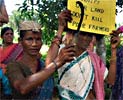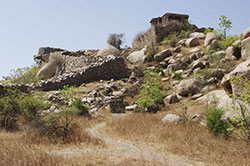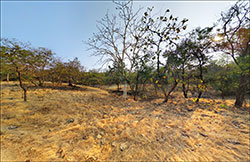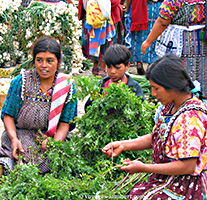A village in Gujarat, India – 1893
Cricket, a children's game?
“Believe me, Mai, mama, we have no choice. Who in our village can pay double taxes? Perhaps a few rich families, but no one else. There was no other way but to accept the challenge, no matter how terrible it is.” Then, Yashodama’s eyes become moist, “When you speak like that, Bhuwan, it is just as if I hear your father again. He also had courage and truth in his heart. Don't worry, with the help of Lord Krishna everything will turn out fine. In you I have total confidence. What are you going to do to win the game?”
Yashodama is an older peasant woman, with a friendly, tranquil face. In her lustrous black hair the first grey can be seen. Because she is a widow, she wears a white sari. Bhuwan is her beloved son, nineteen years old, as strong as a lion, and usually in a good mood. But sometimes, when he is challenged, he gets that fierce look in his eyes. Then, he can be reckless. Like last time.
One afternoon it was blazing hot. There was not much to do on the land, because the rains had not come. Some young men of the village Champaner had walked over to the English army camp. Sitting down in the shade, they watched the English playing cricket. When the ball rolled in their direction, Bhuwan was just explaining to a friend that it looked like gilla-danda, “that game we used to play, when we were kids.” The British captain who came to retrieve the ball, and who spoke a bit of Hindi, caught those words and was deeply offended. “Do you think you can beat us?” he asked Bhuwan angrily. “Of course,” he answered bluntly, “it is no more than a children's game.”
The relationship between the inhabitants of the peasant village and the English occupiers is tense. The taxes that they have to pay are intolerably high. Last year only a little rain fell, and they could only pay half of the lagaan, the tax, with the condition that they would pay double lagaan this year. But this year not a single drop of rain fell. When the village elders of Champaner come to the fort to beg the captain again for a tax deferral, he is as hard as stone. “Last year we agreed on paying double lagaan this year, and I am standing by that. That it didn't rain is not my fault. I have expenses for the fort, and all the soldiers, what do you think? …”
Then, the captain sees Bhuwan standing back a bit. “Come here, you! You found cricket to be a stupid children's game, wasn't it? I will forgive the double lagaan for Champaner this year entirely, on the condition that you will win a cricket match against us. If you lose, you will pay triple lagaan.” The village elders start lamenting, but the captain demands that Bhuwan makes the decision. He hesitates, but then accepts the challenge on behalf of the village. With the help of Lord Krishna, Champaner will win the match, and will not pay taxes this year.
_______________________
Source
Lagaan (2001) is a splendid, double-length feature film by the Indian film-maker Ashutosh Gowariker.
Go to:
= the next page: The reindeer - a remote farm in the marshlands of Iceland – 1899 (1), story 32.
= the Table of contents, story 31.







